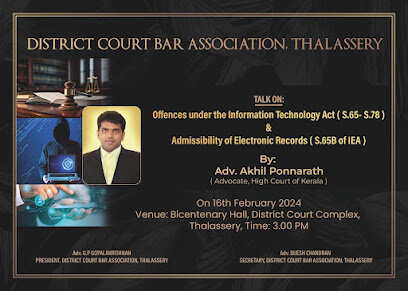Best Criminal Litigation Lawyers in Kannur
Share your needs with us, get contacted by law firms.
Free. Takes 2 min.
List of the best lawyers in Kannur, India
India Criminal Litigation Legal Questions answered by Lawyers
Browse our 1 legal question about Criminal Litigation in India and read the lawyer answers, or ask your own questions for free.
- 377 379 498A and dv
- My wife put allegations on me and my family to police station after seven years of seperation Now police kept calling my and my family for a statement What should i do
-
Lawyer answer by D.H.Associates
Ask the police personnel to share the complaint with you. Reply to the complaint filed by your wife.
Read full answer
About Criminal Litigation Law in Kannur, India
Criminal litigation in Kannur, India, involves the process of prosecuting or defending individuals accused of committing crimes under the Indian Penal Code (IPC) and other criminal statutes. Like elsewhere in India, criminal cases in Kannur typically progress through the local police, Magistrate Courts, Sessions Courts, and higher judiciary as necessary. The role of legal professionals is crucial in ensuring that due process is followed and that the rights of both the accused and victims are protected throughout the legal proceedings.
Why You May Need a Lawyer
Navigating the criminal justice system in Kannur can be complex and intimidating. You may require a lawyer in various situations, including:
- If you have been accused or arrested for a crime and need representation in court
- To seek bail or anticipatory bail if there is a risk of arrest
- For legal advice when you are a victim of a crime and wish to file a police complaint
- If you are summoned as a witness and need to understand your role and rights
- When facing charges relating to white-collar crimes, cybercrimes, or sexual offenses
- For legal assistance during police investigation or questioning
- To appeal or challenge a previous court order or judgment
Having a knowledgeable criminal lawyer ensures that your interests are properly represented and increases the chances of a fair outcome.
Local Laws Overview
Criminal law in Kannur is primarily governed by national legislation such as the Indian Penal Code, 1860, the Code of Criminal Procedure, 1973 (CrPC), and the Indian Evidence Act, 1872. However, the application and enforcement of these laws are subject to local procedures and practices. The local police have jurisdiction to investigate and charge individuals, and criminal trials are conducted in the Magistrate or Sessions Courts at Kannur. The Kerala Police Act and other state amendments may also come into play in specific cases. Bail procedures, remand, investigation timelines, and court hierarchies follow both central and state procedural guidelines, making it essential to have expert guidance on local legal nuances.
Frequently Asked Questions
What should I do if I am arrested by the police in Kannur?
Stay calm and polite. Request to contact your lawyer immediately. You have the right to know the charge against you and to remain silent until your lawyer is present.
What is the difference between bailable and non-bailable offences?
Bailable offences allow the accused to get bail as a matter of right, whereas for non-bailable offences, granting bail is at the court's discretion.
Can I get anticipatory bail in Kannur?
Yes, if you believe you may be arrested for a non-bailable offence, you can apply for anticipatory bail from the Sessions Court or High Court.
What is FIR and how important is it?
A First Information Report (FIR) is the initial document filed with the police when a cognizable offence occurs. It sets the criminal law in motion and is crucial for the prosecution.
How long does a typical criminal trial take in Kannur?
The duration varies depending on the complexity, number of witnesses, and court workload. Simple cases may conclude in months, while others take years.
Can I settle a criminal dispute out of court?
Compounding of offences (mutually settling) is allowed only for certain minor offences specified under the law. Serious and non-compoundable offences cannot be settled privately.
What are my rights during police interrogation?
You have the right to consult a lawyer, remain silent, and not be forced to confess. Any confession made under duress is inadmissible in court.
How can I file a police complaint in Kannur?
You can approach the nearest police station, provide details of the incident, and ensure an FIR is registered. For certain offences, online complaint options may also be available.
Should I hire a local lawyer for my criminal case?
A local lawyer is familiar with the court's functioning and local practices, which can be advantageous for case strategy and regular representation.
What happens if I cannot afford a lawyer?
You can request the court to appoint a legal aid lawyer. The District Legal Services Authority in Kannur provides free legal services to eligible individuals.
Additional Resources
For individuals seeking legal advice or information related to criminal litigation in Kannur, the following resources may be helpful:
- Kannur District Court: Offers court services and information on ongoing cases.
- District Legal Services Authority, Kannur: Provides free legal aid to eligible individuals.
- Kerala State Legal Services Authority (KELSA): For state-wide legal assistance.
- Kannur Police: For filing complaints, information on cases, and police station contacts.
- Local Bar Associations: Can help in finding experienced criminal lawyers.
Next Steps
If you find yourself involved in a criminal matter in Kannur, take the following steps:
- Contact a reputed local criminal lawyer as soon as possible.
- Gather all relevant documents and details related to your case.
- Ensure your rights are protected during any police procedure.
- If in custody, ask for legal aid if you cannot afford a private lawyer.
- Follow your lawyer’s advice strictly and avoid discussing details with others.
- Attend all court hearings as required and cooperate fully with your legal counsel.
Prompt action and professional legal guidance are key to protecting your interests and ensuring fair treatment under the law in Kannur's criminal justice system.
Lawzana helps you find the best lawyers and law firms in Kannur through a curated and pre-screened list of qualified legal professionals. Our platform offers rankings and detailed profiles of attorneys and law firms, allowing you to compare based on practice areas, including Criminal Litigation, experience, and client feedback.
Each profile includes a description of the firm's areas of practice, client reviews, team members and partners, year of establishment, spoken languages, office locations, contact information, social media presence, and any published articles or resources. Most firms on our platform speak English and are experienced in both local and international legal matters.
Get a quote from top-rated law firms in Kannur, India — quickly, securely, and without unnecessary hassle.
Disclaimer:
The information provided on this page is for general informational purposes only and does not constitute legal advice. While we strive to ensure the accuracy and relevance of the content, legal information may change over time, and interpretations of the law can vary. You should always consult with a qualified legal professional for advice specific to your situation.
We disclaim all liability for actions taken or not taken based on the content of this page. If you believe any information is incorrect or outdated, please contact us, and we will review and update it where appropriate.












